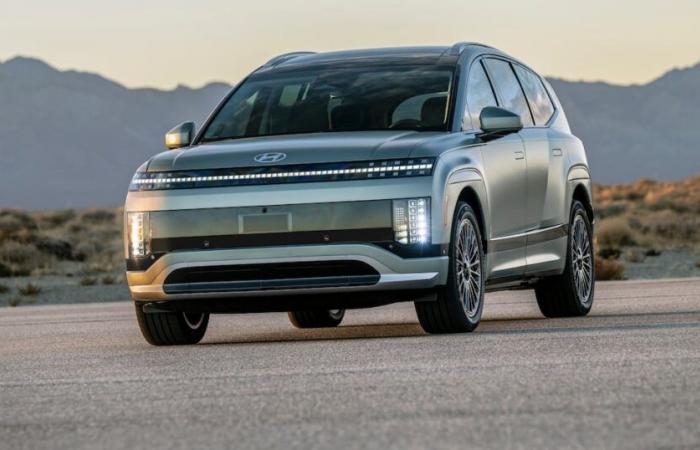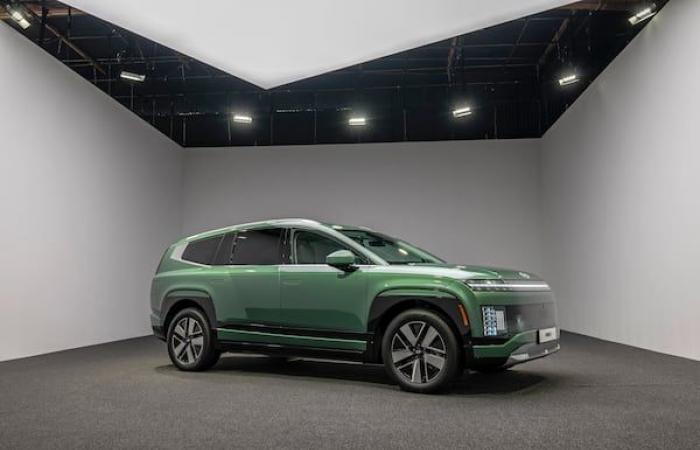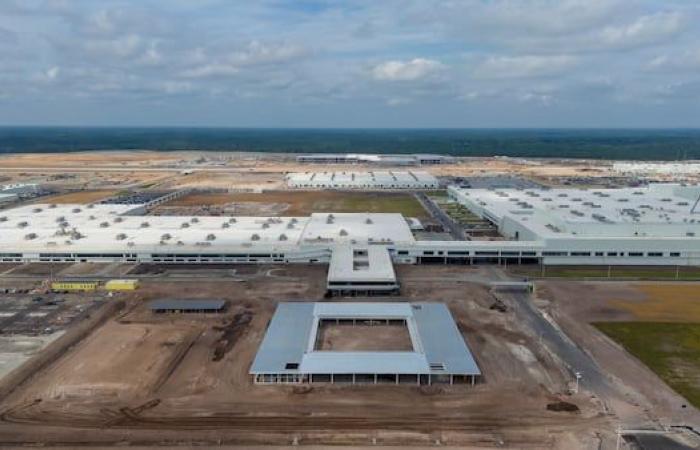The vehicle’s announcement also represents a milestone for Hyundai’s $7.6 billion Metaplant in Bryan County near Savannah, which started production in October. The plant — the largest economic development project in state history — is a landmark in Georgia’s emergence as an EV manufacturing and battery production hub, aiming to redefine the Peach State’s industrial reputation by making it ground zero for the electrification of auto travel.
Credit: Courtesy Hyundai Motor Group
Credit: Courtesy Hyundai Motor Group
Hyundai said the IONIQ 9 demonstrates the automaker’s “unwavering commitment to electrification,” targeting to launch 23 EV models by 2030, according to a news release. The electric SUV will launch in Korea early next year, while subsequent rollouts in the North American and European markets do not have a firm timeline.
The vehicle’s sticker price also wasn’t released, but Hyundai said it will qualify fully for the $7,500 federal EV tax credits. To qualify, the SUV must be priced at less than $80,000.
Still, President-elect Donald Trump is reportedly planning to axe the current tax credit.
Erin Keating, an executive analyst with Cox Automotive, said the tax credits have been most beneficial for drivers who are leasing their vehicles, since a lot of models don’t meet that price threshold. It appears the IONIQ 9 won’t have that issue.
“There’s not nearly as many brands or vehicles that are qualified under the conditions outside of the leasing loophole,” she said.
‘Enhance the EV experience’
Promoted with the slogan “Built to Belong,” the IONIQ 9 is designed to fill a hole in the EV market.
Two- and three-row SUVs and light trucks are among America’s most popular vehicle types. But the EV marketplace is crowded with sedans after industry pioneer Tesla defined expectations for plug-in vehicles.
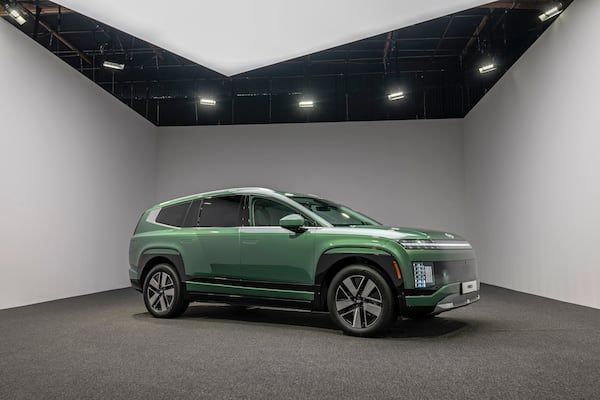
Credit: Courtesy Hyundai Motor Group
Credit: Courtesy Hyundai Motor Group
Hyundai said the IONIQ 9 boasts a streamlined exterior and aerodynamic aesthetic, which the company’s marketing materials calls “aerosthetic.” It’s the first Hyundai vehicle to eliminate its roof antenna, and the first to feature aluminum fenders and quarter panels to reduce weight and increase the vehicle’s range.
IONIQ 9 charges from 10% to 80% in 24 minutes using a 350 kilowatt charger under optimal conditions, Hyundai said. Toting a 110.3 kilowatt-hour battery, the vehicle’s base range is estimated at 335 miles, with every trim expected to get more than 300 miles per charge, according to the U.S. Environmental Protection Agency.
The vehicle, alongside all American-made Hyundais, will be made with the Tesla North American Charging Standard port, allowing drivers to connect to Tesla’s superchargers without an adapter.
Sleek and minimalistic define the IONIQ 9′s facade, but its interior gives off a lounge-like atmosphere. The front two rows feature seats that can fully recline and swivel to face each other when not in motion, depending on the model’s configuration. Hyundai said the flexibility encourages travelers to stay in their vehicle while charging or parked.

Credit: Courtesy Hyundai Motor Group
Credit: Courtesy Hyundai Motor Group
Hyundai said it has integrated specific features to “address common EV customer concerns,” including improved battery consistency, an enhanced torque control display, an energy report feature and a route planner that includes charger locations.
“These features combine advanced technology with practicality to enhance the EV experience,” the release said.
Made in Georgia
The IONIQ 9 will soon roll off Peach State assembly lines alongside Hyundai’s IONIQ 5 electric sedan.
Located along I-16 about 30 minutes west of downtown Savannah, Hyundai’s Metaplant is expected to eventually span 16 million square feet and employ 8,100 workers. Once fully operational, it’s expected to have an annual manufacturing capacity of 300,000 vehicles.
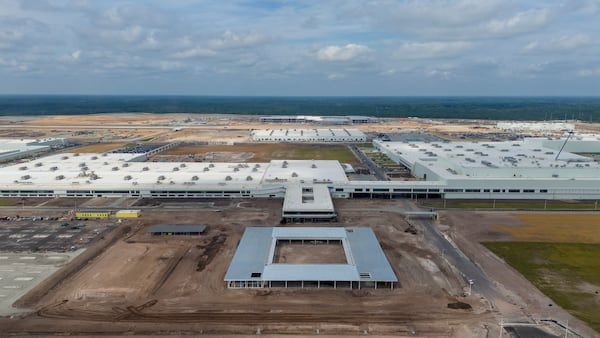
Credit: Courtesy Hyundai Motor Group Metaplant America
Credit: Courtesy Hyundai Motor Group Metaplant America
To woo Hyundai to Georgia, state and local officials offered up to $1.8 billion in incentives — the largest such offer in Georgia history. The bulk of those incentives are accumulated once Hyundai meets its investment and employment promises.
Company officials previously said the factory will produce models across Hyundai, Kia and Genesis fleets, but it’s unclear how many models are anticipated. Kia helms the only other operational vehicle manufacturing factory in Georgia at West Point, where production of the EV9 started early this year.
Hyundai and Kia have seen their EV sales increase in recent quarters, which played a factor in Tesla’s market share dipping below 50% for the first time this summer. At the end of September, Tesla still commanded 48% of the EV sector followed by Ford (6.8%), Chevrolet (5.8%), Rivian (4.4%), Hyundai (4.2%) and Kia (4%), according to data from Cox Automotive.
“They’ve built them, they’re here and they’re good cars,” Keating said. “… I don’t think there’s any automaker out there saying, ‘Hey, let’s get rid of EVs.’ Everybody has already sunk their costs and made major investments.”
Increasingly, those EVs and their battery materials are being built in Georgia.
Since 2018, Georgia has announced more than 50 EV and battery projects that combine for $28 billion in investment and more than 36,000 anticipated jobs, according to the Georgia Department of Economic Development.
Cox Enterprises, the owner of The Atlanta Journal-Constitution and Cox Automotive, also owns a 3% stake in Rivian.

